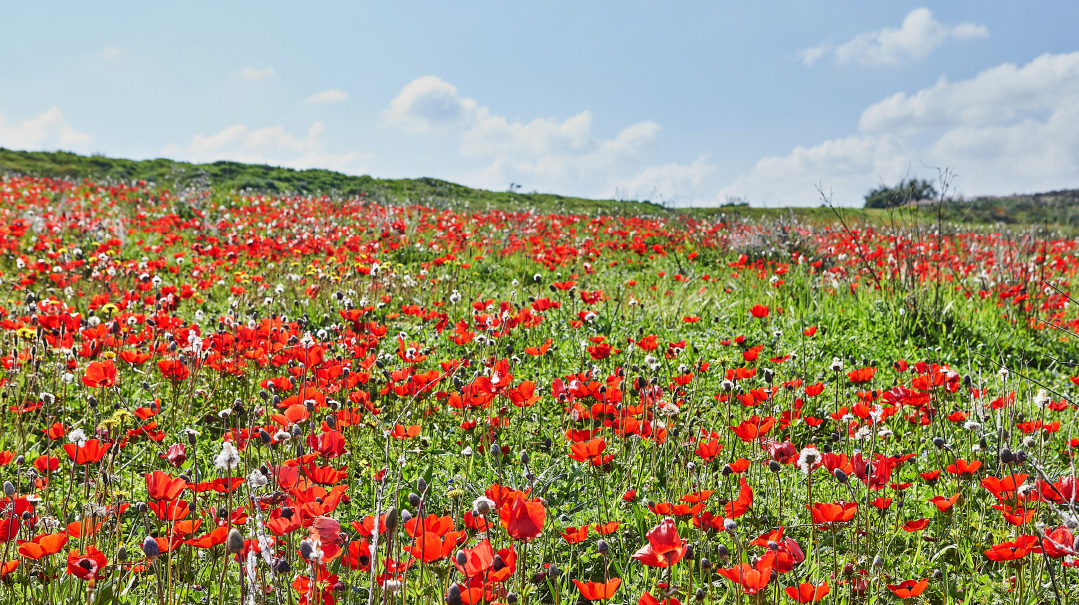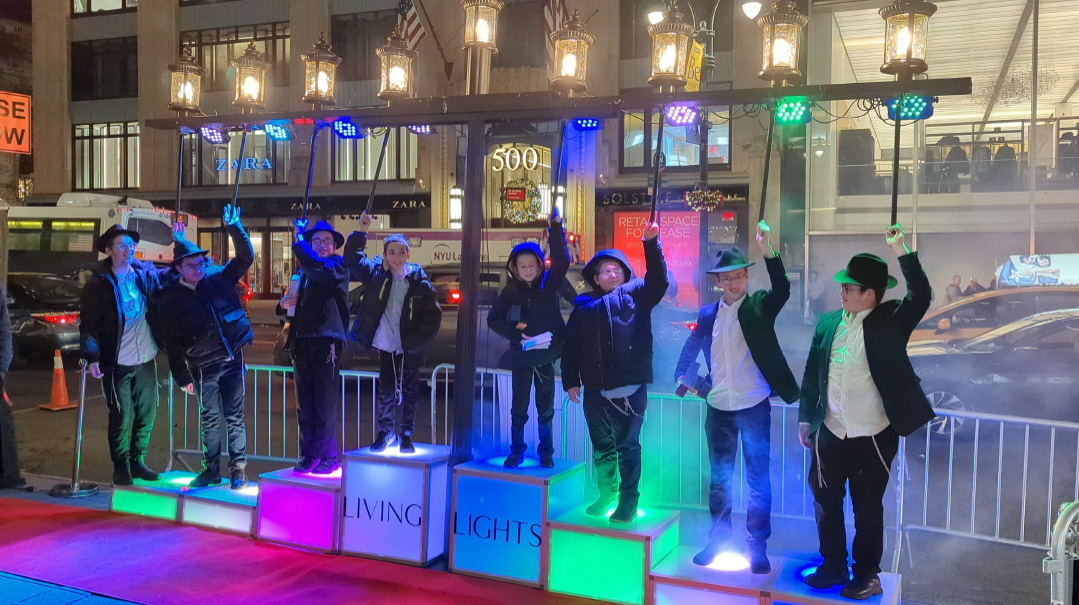Still Smiling
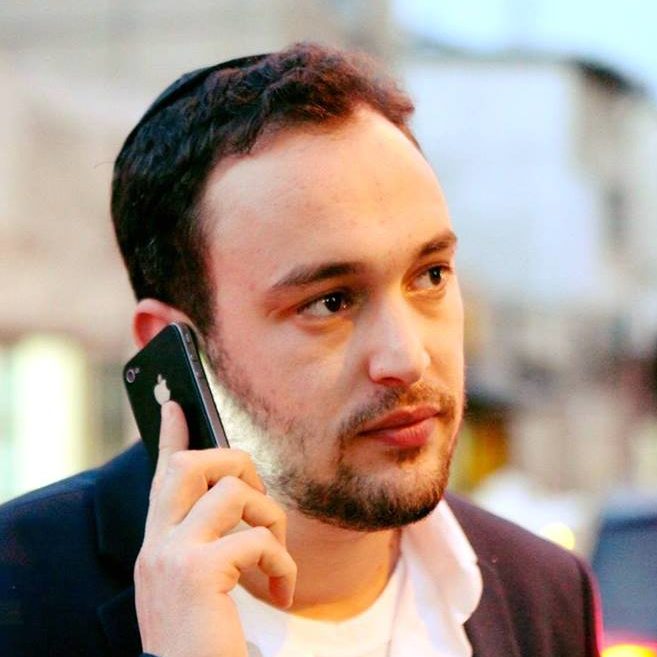
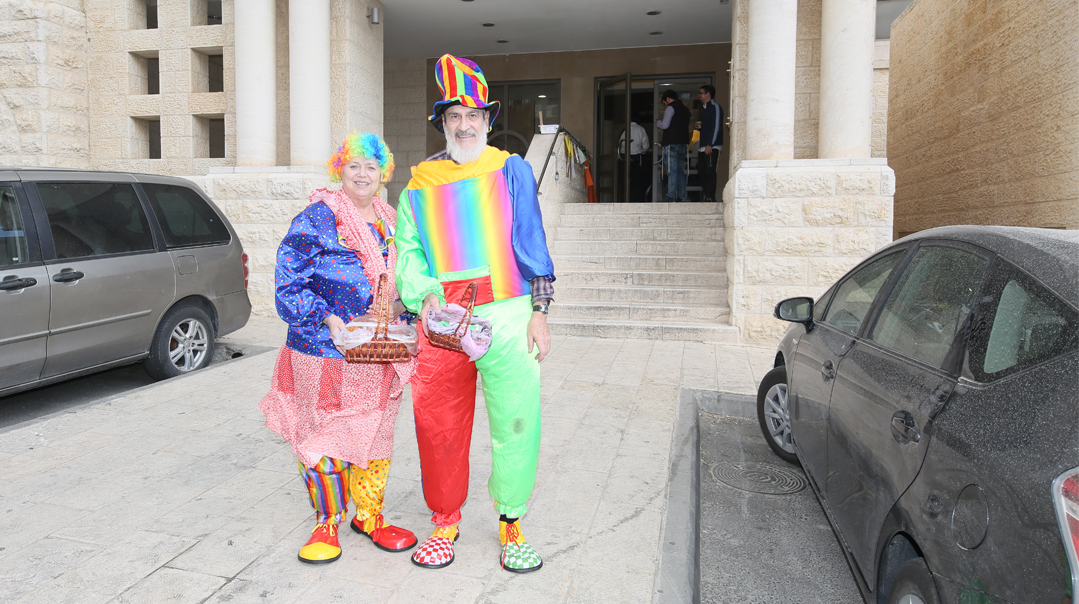
W
ho was this bearded man in the big hat and bright stripes that looked so much like the murdered clown? You Couldn’t Miss the Costume, Even from Afar.
It was a clown costume in vertical stripes of bright green, orange, blue, and yellow, with a matching hat and shoes. To the children of Har Nof, the costume looked familiar. For the last few years, they’d become accustomed to a tall clown dressed in those colors greeting them on their way to school with candies. But two murderous terrorists, they knew, had snuffed out the life of the big friendly clown last winter. So who was this bearded man in the bright costume?
“Come!” the clown beckoned as the children approached the intersection of Katzenelenbogen and Agassi streets. “Take some candies! Purim is coming! A bit of simchah won’t hurt us, right?” Next to the clown, sitting in a chair, was a woman with similarly bright getup and a smile. “Take some candies, children,” she offered. “And make sure to read the note.”
The children helped themselves to the usual taffies in their bright wrappers. Then they focused on the little notes that had been carefully stapled on to each wrapper, and it all became clear. The notes read:
“Happy Chodesh Adar! Make a brachah in memory of Chaya Chana bas Reb Aryeh ztz”l, and in memory of the kadosh Reb Aryeh ztz”l ben Shlomo Kupinsky.”
“Kupinksy?” one of the little boys aked. “Isn’t he the one who used to stand here giving out candies?”
“Exactly,” the elderly clown said, sadness and satisfaction mingling in his eyes. “Our son Aryeh used to give out the candies for many years, but he can’t do that anymore. So we’re giving out the candies instead. That’s the least that we can do, to try to keep the kids of Har Nof happy.”
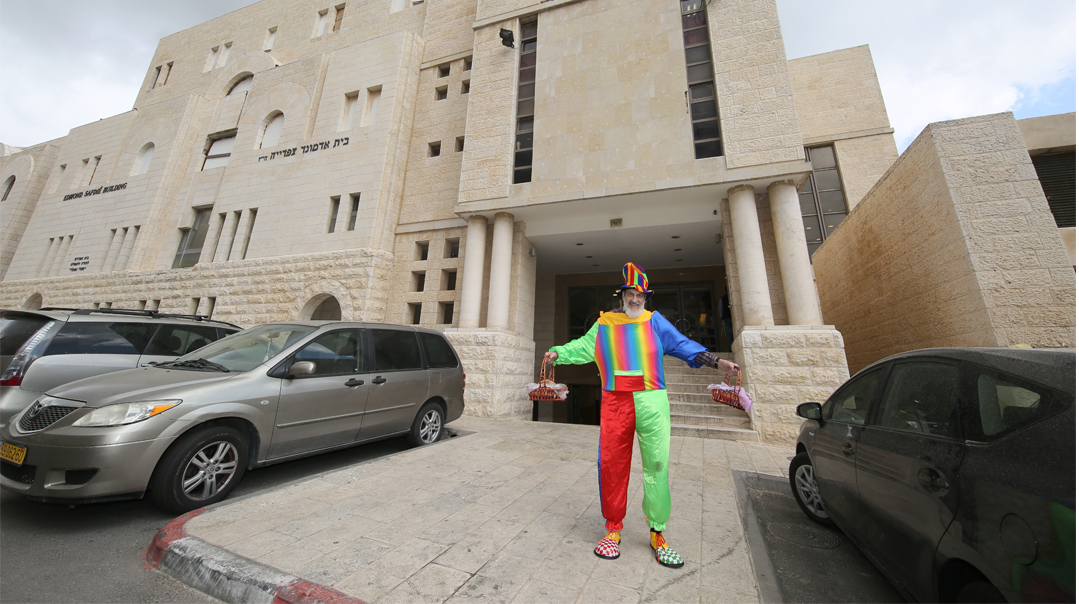
The Bigger Picture
After two hours stationed at the intersection leading to the shul where their son spent his last moments, the Kupinskys packed up the last of their toffees, took off the costumes, and returned to their routines.
“This is the second year that we’re giving out the candies,” Shlomo Kupinsky says. “Last year, it was just a few months after Aryeh had been killed, but we felt it was important to continue his minhag. So I bought the taffies and put on his costume. It was a rainy day, we stood there under our umbrellas, determined not to let the weather stop us. Very few children were walking to school. But as the cars passed by, the parents noticed my costume and they all pulled over so the kids could get their candies.”
The senior Kupinskys live in Kiryat Arba, a fair distance from the Jerusalem neighborhood where Aryeh performed his quiet acts of chesed. They made aliyah when Aryeh was just ten years old, Shlomo finding worked in the Rabbanut and Bracha utilizing her doctorate in education to find positions in elementary and high schools in both Jerusalem and Kiryat Arba. Aryeh attended Heichal HaTorah, Netiv Meir, and Kerem B’Yavneh. After his marriage, he served in the chaplaincy unit of the IDF, and then began learning in a Har Nof kollel. “He always had a penchant for chesed — he was the type of person who just seemed to find opportunities for chesed everywhere he went,” says his father. But it was only after his tragic murder at age 43 that his parents got the fuller picture of how special their son was.
“We’ve learned a lot about Aryeh since that day,” Mrs. Bracha Kupinsky says.
They found out that their son used to stand at the corner every morning and make sure the children crossed the street safely. “All the local children recognized him,” Shlomo says.
During the shivah, they also learned that Aryeh had volunteered his Har Nof apartment to families living in the line of fire during the Gaza shelling campaigns. Every Shabbos, he packed up his children and visited relatives, leaving a welcoming, quiet apartment to families who desperately needed the respite. Not only that, he’d leave a warm cholent waiting for them, too.
And there was also his freezer gemach, designed to help local residents making simchahs. This gemach had a twist, though: It included personal delivery by Reb Aryeh himself. “He would insist on schlepping those freezers to the baalei simchah,” Bracha remembers. “And he’d come by afterward to pick them up, too. Once we were visiting when we saw him schlepping a freezer. My husband told him he’d buy him a dolly to help transport the freezers. But he laughed it off. ‘Please, it’s nothing!’ he told us.
“It’s true that he was big and strong, but I think it was the chesed that made those freezers feel so light to him. When it came to chesed, nothing was too hard for Aryeh.”
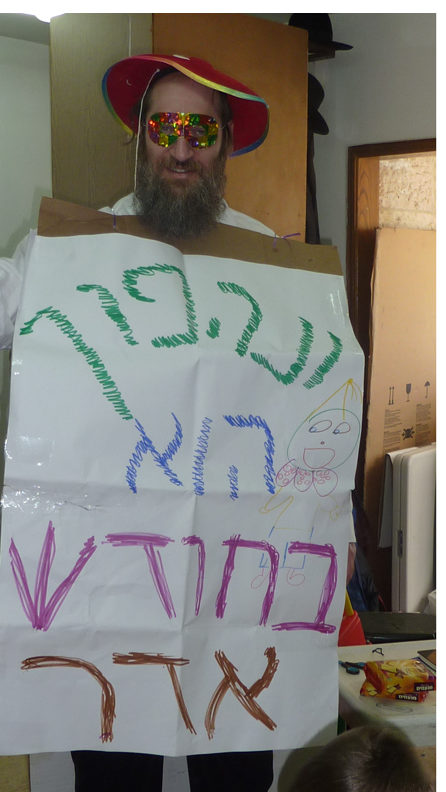
Purim Was His Day
“Aryeh was one of those people who was constantly happy,” Mrs. Kupinsky says. “But Purim was his day. He would literally beam with joy. He’d review the halachos of Purim starting on Rosh Chodesh, and you could see his joy mounting as it got closer.”
“We would come visit for the Purim seudah, a day after our Purim seudah in Kiryat Arba,” Shlomo says. “You had to see how happy he was. He would go from house to house in his trademark clown costume, singing and dancing. One of the neighbors later told us that he would find out which type of drink every family loved best, and make sure to include that type of drink in their mishloach manos. He knew that the little details were important when it came to mitzvos.”
Then a terrible tragedy visited the family. Fourteen-year-old Chaya Kupinsky suddenly passed away in her sleep. “Losing Chaya was a very big blow for Aryeh,” Mrs. Kupinsky says. “He took it very hard. But then he pulled himself together, and he managed to channel the pain as an impetus for yet another chesed. He decided that as he helped the children cross the street on Rosh Chodesh Adar, he would put on a clown costume and give out candies, asking the children to make a brachah in her memory.”
Reb Aryeh managed to carry out that new campaign only twice before tragedy visited the family yet again. This time he was the victim, when a terrorist massacre in his early-morning minyan left five families bereft and an entire nation shocked and horrified.
“During the shivah, a woman came to the house and told me that her husband had been there during the attack,” remembers Bracha Kupinsky. “When he came home, he told her how our Aryeh fought off the terrorists, throwing shtenders and benches at them — the only weapons he had. During those long moments that he kept up the fight, more than ten people managed to escape the shul. Until that point, we hadn’t realized the extent of his mesirus nefesh. He fought so hard to save his friends.”
A Rock and Its Ripples
“One of the first things we decided, after the shivah was over, was that our family had to keep up Aryeh’s chesed,” the Kupinskys remember. “We divided up the freezers among our children. Then we heard that other people were opening up freezer gemachs in his memory in all these different yishuvim in Israel. Later we heard about similar gemachs around the world. Someone just opened one up in America — all in his memory.”
But as Adar neared, they remembered the candies, too. “When we said we were committed to perpetuating Aryeh’s legacy of chesed, we meant it in every sense of the word,” Shlomo says. “As Adar approached, we tried to figure out who would take over the candy distribution. Finally we decided to do it ourselves.”
So on Rosh Chodesh morning, the senior Kupinskys left their Kiryat Arba home at 5 a.m. Shlomo davened at the k’vasikin minyan in Har Nof. At seven promptly, they were stationed at the intersection in their clown costumes, taffies at the ready.
“People ask me if it’s hard,” Shlomo says. “Imagine someone at my age, standing on the sidewalk for hours in a clown costume giving out candy. And my first answer is that nothing comes close to seeing that smile on the face of a little child when you hand him a candy.
“But there’s something else. When you throw a rock into a well, ripples of water flow outward. For those ripples, it’s effortless; they’re just propelled in a certain direction. Aryeh was like our rock. All the ripples that emerged from his passing — they’re just the natural results.
“This is our mission, and we feel an inner compulsion to keep doing it. We’re simple people who merited to have a special son, and we will never stop mourning him. But we will never let our grief overtake us. When you put your all into making something out of your life, even after a blow like this, then Hashem gives you the strength to keep smiling. We’re sure that Aryeh is looking down at us from Gan Eden, and that he feels the sweetness of the candies we’re giving out.”.
(Originally featured in Mishpacha, Issue 603)
Oops! We could not locate your form.







